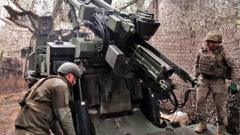In the shadow of heavy aerial bombardments in Eastern Ukraine, the landscape is marked by devastation as Ukrainian soldiers grapple with the harsh realities of war while nurturing a flicker of hope for peace.
Ahead of a critical front line in Pokrovsk, they gather in a makeshift command center, monitoring live drone feeds that capture the chaos of the ongoing warfare. “I want to believe this would be the beginning of the end of the war,” says a soldier identified only by his call sign “Kozak.” His sentiments reflect a hesitance yet longing for resolution as diplomatic talks between Ukraine and Russia, stalled for three years, finally seem to gain traction.
Despite the harshness of their current circumstances, including mounting casualties, soldiers find solace in recent negotiations led by international actors, suggesting that a path towards dialogue might be opening. "Russia was the first one to push for talks," Kozak notes, potentially indicating a shift in their military strategies. “We have been successful in destroying their rear positions,” he affirms, signaling growing confidence among troops who witness firsthand the defense of Pokrovsk, a critical transport hub in the Donetsk region.
However, soldiers like Yurii, a former tech worker turned frontline fighter at 37, express skepticism about the merits of territorial concessions for peace. “It’s painful to hear that,” he states, reaffirming the belief that ceding land would only lead to further aggression from Russia. “They will never understand how many brothers and friends we have lost. We shouldn’t give up a single metre of our land," Kozak emphasizes.
As artillery shells explode, the sound of warfare punctuates their discussion—reinforcing the dire need for continued support from international allies. With the use of advanced weaponry like France’s Caesar artillery guns, the troops strive to keep pace with evolving battle technologies, although they remain concerned about the increasing usage of effective drone warfare by their adversaries.
The impact of more than three years of conflict is tragically visible, seen through the faces of grieving families like Yana Stepanenko, who mourns her son killed in combat. Even as political discussions prioritize a chance for resolution, the sentiment among those who have sacrificed—both on the battlefield and at home—remains complex and fraught with fear of unresolved bloodshed. Yana’s heartbreak resonates with a sense of lingering despair. "I want to live in Ukraine, not Russia," she states defiantly, reflecting the longing for sovereignty amid sorrow.
With the front lines continually shifting and uncertainty prevailing, the future of peace remains precariously balanced—a hope intertwined with the harsh realities of ongoing war. Though soldiers and civilians alike cling to diplomatic developments, the scars of conflict are far from healed, driving home difficult choices regarding their homeland's future in the face of Russian aggression.

















